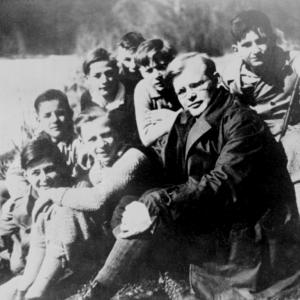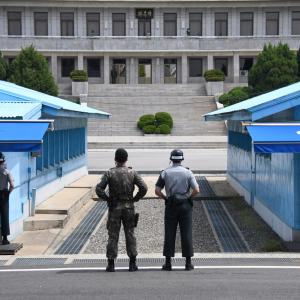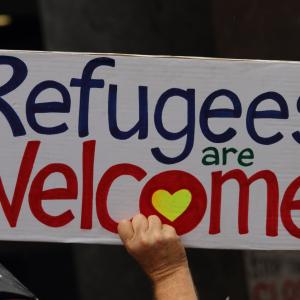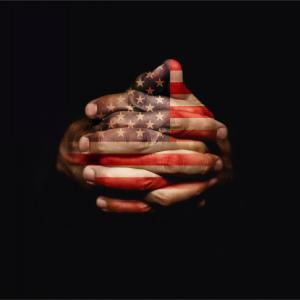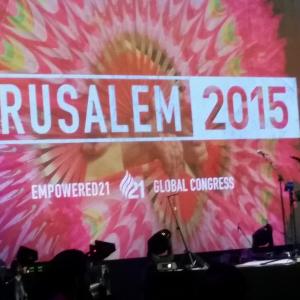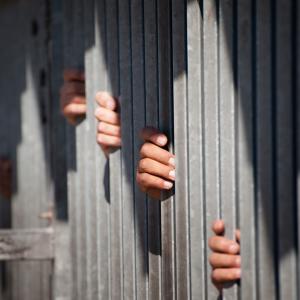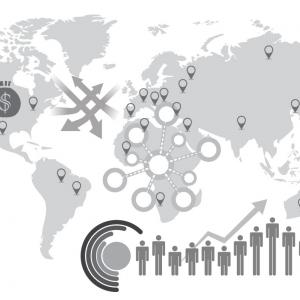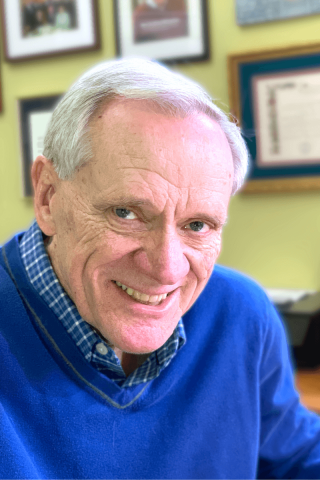
Wes Granberg-Michaelson is a contributing editor to Sojourners. His forthcoming book is The Soulwork of Justice: Four Movements of Contemplative Action (Orbis Books).
His other books includeing Without Oars: Casting Off into a Life of Pilgrimage, From Times Square to Timbuktu: The Post-Christian West Meets the Non-Western Church, and Future Faith: Ten Challenges for Reshaping Christianity in the 21st Century.
He served as general secretary of the Reformed Church in America for 17 years from 1994 to 2011. Previously he held the position of director of church and society at the World Council of Churches in Geneva. Earlier in his career he served as executive and legislative assistant to U.S. Senator Mark O. Hatfield (1968-1976) and then as the associate editor of Sojourners magazine when it was founded. He played a leading role in establishing Christian Churches Together in the USA, and presently helps guide the development of the Global Christian Forum. Over the course of his ministry his ecumenical work has taken him to all corners of the world. In addition to the recent titles listed above, he is the author of Underexpected Destinations: An Evangelical Pilgrimage to World Christianity and Leadership from Inside Out: Spirituality and Organizational Change, as well as four other earlier books. His numerous magazine articles have appeared in Sojourners, The Christian Century, The Church Herald, Ecumenical Review, and other publications.
In the fall of 2012, Granberg-Michaelson was appointed as a Distinguished Visiting Scholar at the John W. Kluge Center of the Library of Congress. While there he researched and wrote the book From Times Square to Timbuktu: The Post-Christian West Meets the Non-Western Church (Eerdmans, Fall 2013). The book deals with the effects of the shift in world Christianity to the global South, and impact of global migration on congregational life and society in the global North. It was chosen to be part of the 2013 National Book Festival in Washington, D. C.
Granberg-Michaelson is a graduate of Hope College and Western Theological Seminary, both in Holland, Michigan, and was ordained as a Minister of Word and Sacrament in the Reformed Church in America in 1984. Presently he continues his work in ecumenical organizations, in writing and public speaking on issues facing world Christianity, and consulting to church-related organizations. He serves today on the governing boards of Church Innovations and the Global Christian Forum. His wife, Kaarin Granberg-Michaelson, is an ordained minister in the Reformed Church in America, and they have two children. He and Kaarin live in Santa Fe, New Mexico.
Posts By This Author
Bowling Together
Rejecting the heresy of individualism.
IN HIS BOOK Community and Growth, Jean Vanier explains that for any community to thrive, there must be more members who can say “me for the community” than those who say “the community for me.”
That simple contrast—me for the community vs. the community for me—captures the heart of the dilemma facing modern Western culture and, by extension, the expressions of the church that are sustained in its midst. The Enlightenment and the models for political, social, and economic life that it spawned in modern Western culture freed humanity from oppressive, authoritarian rule governing thought, religion, and political structures. The role, rights, and agency of the individual became paramount. This revolutionized the philosophical framework for how society should be governed.
In contrast to individualism, what generally can be termed “collectivism” begins by asserting that realities of social groups are the primary reference point for understanding how societies should be organized and governed. In a nutshell, individuals don’t really have a meaningful identity apart from their belonging to a social group. Participation in a collective group, in this view, is both a more realistic understanding of how society functions and is the context that makes individual life possible.
For political philosophy, the question becomes where the starting point is: Does society find its moral foundation in the rights of its individual members, who then make agreements and social contracts for how best to preserve these rights? Or does society begin by recognizing we are social beings, and collectively we decide—through various political processes—how best to secure the rights of all who belong to a shared community? Normally this becomes a healthy political dialogue between the primacy of individual freedom and the responsibility of upholding the common good of society.
But ideas can be pushed to extremes, at times with frightful consequences of enormous social evil.
When Seminary Becomes a Threat
In 1935 Dietrich Bonhoeffer founded an underground seminary of the Confessing Church.
Crucial to our response to all this, however, is a fundamental question: Are we confronted today simply by another set of vexing economic and social developments that require our attention? Or is something deeper at stake? Are we facing forces that constitute a spiritual assault on the integrity and truth of Christian faith in today’s world? Is this a time when our response, however well intended, will be inept unless it is grounded in a spiritual resilience that confesses faith in Jesus Christ, through the power of the Spirit, who unmasks and defies powers that would subdue and crush the public integrity of the gospel in the world?
This is, in truth, the crucial question for us to discern. And it is deeply serious. I’d pose it this way: When rising forces of nationalistic exclusivism are fueled by racial bigotry, when a naked global struggle for money and power shreds bonds of human solidarity, and when unbridled greed threatens planetary survival, is the truth and integrity of our faith at stake? Is the only response capable of addressing the roots of this crisis one of spiritual resistance and renewal rooted in what it means to confess Jesus Christ as Lord? In other words, is it a kairos moment calling us to a clear discernment of what it means, in this present context, to confess our faith? And must such a confession then shape the communities of those who believe the gospel? In my view, the answer is yes.
Artificial Litmus Tests and the Threat to Christian Unity
Differences in the body of Christ over ethical and theological issues have been with the church since its inception. The letters of the New Testament and ministry of its first leaders were focused on how we live together in the face of inevitable tensions. Our call is to display an outpouring of humility, a commitment to the well-being of other brothers and sisters, and a self-giving love that builds a community truly shaped by the Spirit and acting as a corporate body infused with the love of Jesus.
I Worked for the Senate During Vietnam. PBS' 'The Vietnam War' Is a Must-Watch.
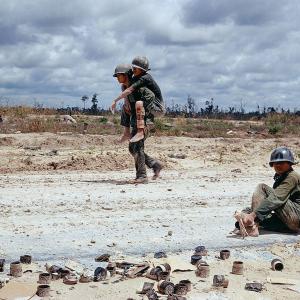
Image via manhhai/Flickr
At no point did I see a Niebuhrian “just war.” The entire enterprise was a moral disgrace.
What U.S. Christians Miss About North — and South — Korea
Two realities here in South Korea seem unknown or underappreciated in the U.S. First is the fact that the Korean War has not ended. There’s no treaty, and no permanently recognized peace — only an agreement 60 years ago to cease actual hostilities.
Faith on Public Trial
Of the many shocking images from Charlottesville, one continues to haunt me. White men, mostly younger, are marching and carrying torches in the night with faces full of grim hate and determined anger. It was malevolently reminiscent of the Ku Klux Klan’s torch-lit night rallies, with cross burnings and the evil actions and killings that often followed. Even more, it brought memories of the Nazis marching with their torches, slogans, and violence in the 1930s. The neo-Nazis in Charlottesville chanted some of those same slogans.
Ecumenical History Under the Radar
The same week that President Donald Trump was meeting with Pope Francis in Rome, another historic event was taking place, as the Global Christian Forum facilitated a groundbreaking encounter with the major global bodies representing most every part of world Christianity.
Christians Are Trying to Welcome the Stranger. Will the President Let Us?
No president should be allowed, without any justifiable warrant, to deny the free exercise of their religious convictions, especially when those actions serve not their own interests, but the displaced, suffering millions of strangers in the world longing for welcome.
Two Very Different National Prayer Breakfasts
We sit here today, as the wealthy and the powerful. But let us not forget that those who follow Christ will more often find themselves not with comfortable majorities, but with miserable minorities. Today our prayers must begin with repentance. Individually, we must seek forgiveness for the exile of love from our hearts. And corporately as a people, we must turn in repentance from the sin that scarred our national soul.
5 Spiritual Survival Strategies in the Trump Era
The inner lives of many have been thrown into spiritual disequilibrium. Even while we search for political responses, and may find encouragement in the unprecedented mobilization of the millions marching on every continent, we need to discover the roots for resistance and creative public engagement that can be spiritually sustained for the long run.
I’ll put it this way: When they go low, we go deep.
The Evangelical Brand Lost in Iowa
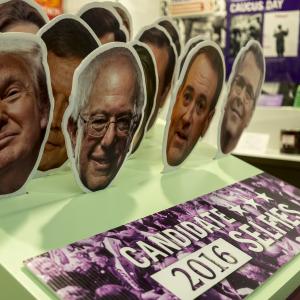
Candidate faces-on-a-stick at the Iowa Historical Building. Phil Roeder / Flickr.com
So who was the real loser in Iowa last night? The "evangelical" brand. For weeks now the nation has heard the media talk about "evangelicals" — by which they actually mean white, highly conservative, older, mostly male voters motivated by their faith. Last night one pundit after another analyzed who this “evangelical” vote supported, with data showing Ted Cruz winning significant backing.
Holy Refugees
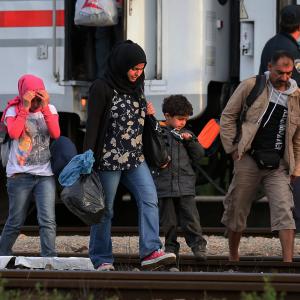
Syrian refugee family in Croatia, Sept. 17. Photoman29 / Shutterstock.com
If Donald Trump had been Pharaoh of Egypt, the Holy Family never would have escaped from Herod’s persecution. Jews would have been prohibited from entering the country. Christmas features the story of a family from the Middle East leaving a homeland in fear and seeking refuge is a foreign land, just as millions do today.
If you visit Egypt and its ancient Coptic Church, you’ll see images of the Holy Family everywhere: Joseph, Mary — always on a donkey — and the infant Jesus. They are moving, wandering. You’ll find pictures of them passing by the pyramids. Egyptian Christians treasure this story for theirs is the land that offered welcome and hospitality to the Son of God when he was a refugee.
Francis Effect? Try the Gospel Effect
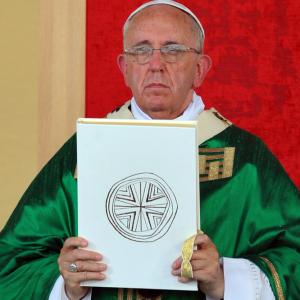
Image via miqu77 / Shutterstock
Watching hundreds of thousands wait 12 hours for a 12 second glimpse of Pope Francis, listening to jaded journalists drop their professionalism and confess their faith — or desire for it — when covering the Pope, and seeing self-serving politicians become humble and hopeful, I ask, what is this “Francis Effect?”
In the end, it’s not about Pope Francis. He would be the first to say so. A gimmicky CNN invitation asking viewers to tweet three words describing the Pope yielded this from one its reporters: “Not me. You.”
But what causes this response? It is, quite simply, the authentic message of the gospel. The gospel of mercy, the gospel of joy, the gospel of love. Christians believe that Jesus is the compassion of God. The church is formed to embody this reality.
History Facing History: When Pope and President Meet
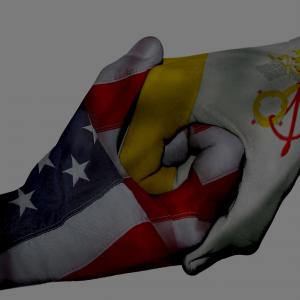
Image via MattiaATH/Shutterstock
When President Obama meets with Pope Francis tomorrow, the world will catch a glimpse of what history looks like. The first pope from the global South in 1200 years will be welcomed in the White House by the first African-American president of the United States. This picture will be worth far, far more than a thousand words.
Pundits will analyze each public word spoken, and search for hints about the private words exchanged between these two. The politics of Pope Francis’ interaction with the President, and later with Congress, will fuel incessant speculation from Washington’s insiders. But around the world, and particularly in the global South, it’s the symbol of this meeting which will matter.
Pope Francis represents the changing face of world Christianity. Today, one billion Christians are found in Latin America and Africa. In 1980, more Christians were found in the global South than in the North for the first time in a thousand years. Every day, that movement accelerates. Francis’ words about the world’s injustices, and his actions of humble human solidarity, project the voice and longings of world Christianity’s new majority and resonant far beyond the boundaries of this faith.
President Obama symbolizes the changing demographics of America. Hope and demographics elected him in 2008, and by 2012 the changing face of the electorate in the U.S. proved determinative of America’s political future. Today, a majority of babies born in the U.S. are non-white, and some major urban areas already reflect the coming reality of a society without a racial majority.
A Duet of Demise
My experience in the worlds of both religion and politics convinces me that one of three issues is at the heart of the catastrophic demise of any leader — money, sex, or power. Sometimes it’s a trifecta of all three together, like the case of John Edwards, the former Democratic presidential candidate. But in virtually every case, a leader’s personal inability to exercise appropriate constraint and control over one or more of these three dimensions of life can lead to careers that crumble and reputations that become shattered.
That’s why, despite all the fascination on the external qualities, traits, and strategies of successful leaders, it’s their internal lives that can be far more decisive in their long-term ability to be transformative leaders — or not. But that requires attentiveness to the powerful but often hidden dynamics of one’s interior life, which “successful” leaders rarely have the time or courage to undertake.
Pentecostalism in a Postmodern Culture
“It’s a new form of Christianity,” explained Opoku Onyinah, “now also living in the West.” He’s the president of the Ghana Pentecostal and Charismatic Council, and also heads the Church of Pentecost, begun in Ghana and now in 84 nations. Onyinah was speaking at a workshop on “How Shall We Walk Between Cultures,” and explaining how African Christianity is interacting with postmodern culture. It was part of Empowered21, which gathered thousands of Pentecostals in Jerusalem over Pentecost.
I’ve found this idea intriguing. Pentecostalism, especially as it is emerging in the non-Western world, is a postmodern faith. Often I’ve said, “An evangelical wants to know what you believe, while a Pentecostal wants to hear your spiritual story.” Perhaps it’s an oversimplification. But Pentecostalism embodies a strong emphasis on narrative and finds reality in spiritual experiences that defy the logic and rationality of modern Western culture.
'And Your Daughters Shall Prophesy'
Christine Caine gave a passionate and prophetic call for the church to be continually changing, even while at its core, it is “the same.” That constant change is driven by God’s continuing call to be sent as witnesses in the world. “We want power,” she told the spiritually hungry Pentecostals gathered before her. “But we don’t know what it’s for.” It’s not for ourselves, not for our own spiritual ecstasy. The power of God’s Spirit is given for us to be witnesses to God’s transforming love. And one can’t change the world without being in the world, instead of running from it. “We’re not here,” Christine Caine proclaimed, “to entertain ourselves.”
You could feel how her words stuck a deep chord within the crowd of those listening. I walked over to sit by a friend who is bishop of a large Pentecostal church. “This is the best word that’s been spoken,” he said to me. And that’s after we had heard eight world famous Pentecostal preachers.
Finding Cracks in the Walls of Ecclesiological Separation
JERUSALEM — One out of four Christians today is Pentecostal or charismatic, which means one of every 12 persons living today practices a Pentecostal form of Christian faith. This, along with the astonishing growth of Christianity in Africa, are the two dominant narratives shaping world Christianity today. Further, the gulf between the older, historic churches, located largely in the global North, and the younger, emerging churches in the global South, often fueled by Pentecostal fire, constitutes the most serious division in the worldwide Body of Christ today.
One can also frame this as the divide between the global Pentecostal community, and the worldwide ecumenical movement. Each lives in virtual isolation from the other, and both suffer as a result. I call it ecclesiological apartheid, with its own endless, winding walls of separation. And these walls need to come down, for the sake of God’s love for the world.
It’s become my passion, in whatever small ways, to make some cracks in these walls.
More Than Demographics
The story of world Christianity’s recent pilgrimage is dramatic and historically unprecedented. The “center of gravity” of Christianity’s presence in the world rested comfortably in Europe for centuries. In 1500, 95 percent of all Christians were in that region, and four centuries later, in 1910, 80 percent of all Christians were in Europe or North America.
But then, world Christianity began the most dramatic geographical shift in its history, moving rapidly toward the global South, and then also toward the East. By 1980, for the first time in 1,000 years, more Christians were found in the global South than the North. Growth in Africa was and remains incredible, with one of our four Christians now an African, and moving toward 40 percent of world Christianity by 2025. Asia’s Christian population, now at 350 million, will grow to 460 million by that same time. Even today, it’s estimated that more Christians worship on any given Sunday in churches in China than in the U.S.
Is the Proliferation of Denominations a Failure to Die to Ourselves?
Denominations proliferate in Korea, Rev. Lee said, because church leaders have failed to die to themselves. People are concerned about recognition and their reputation, taking the glory for themselves, instead of for God. And Rev. Lee identified income inequality in South Korea as one of its greatest problems. Again, it calls for dying to the idol of wealth, and putting God’s love, along with serving one another, at the center.
The expected ecumenical agenda of economic justice, peace, protection of God’s creation came before the Jeju Forum in clear and forceful ways. Agnes Abuom, from Kenya, who is Moderator of the WCC Central Committee, said we are slaves to the larger economic and political systems; that’s another way in which we have to die to ourselves, echoing words from the Rev. Lee’s sermon.

